 |
|
 |
|
| About Us | Essential
Library |
Homepage Archive | Resources | Composer Links |
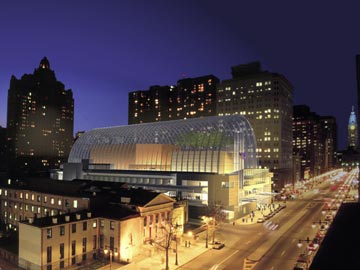 The new Kimmel Center for the Performing Arts is home to 2,500-seat Verizon
Hall, a cello-shaped concert hall with mahogany walls and state-of-the-art
acoustics designed especially for The Philadelphia Orchestra by Russell
Johnson, and a 650-seat Perelman Theater, with a stage that rotates to
accommodate chamber music, recitals and dance.
The new Kimmel Center for the Performing Arts is home to 2,500-seat Verizon
Hall, a cello-shaped concert hall with mahogany walls and state-of-the-art
acoustics designed especially for The Philadelphia Orchestra by Russell
Johnson, and a 650-seat Perelman Theater, with a stage that rotates to
accommodate chamber music, recitals and dance.

|
ANOTHER OPERA HOUSE FOR BERLIN? Does Berlin need a fourth opera house? There is a proposal to build one, devoted to music theatre written since 1945. The design is sleek - like a space ship, and the project is creating a sensation. But "there are a few problems. Berlin, which can no longer afford to maintain its three existing opera houses, is probably the European capital least likely to want to pay for another. The national government has already categorically said it will not provide money for the project; Germany already has some 80 opera houses." Andante 01/04/02 A PLEA FOR BACK TO BASICS: Why must opera directors muck up perfectly good classic operas? "The curse of the megalomaniac producer is not confined to Britain. In fact we get off quite lightly. It is now almost impossible to see a classic opera in Germany in a reasonably traditional production. There must be a new 'Konzept', good or bad makes no difference." The Telegraph (UK) 01/05/02 WILL OPERA SURVIVE? Gerard Mortier wonders about the future of opera: "For years now, like vampires, we so-called managers and artistic directors have been sucking fresh blood from film and theater directing to secure a little more eternity for opera. I have taken great delight in doing so. The experience was an important one - it brought about refreshing new interpretations of works. In the meantime, however, this process has itself become clichéd, possibly even a pure publicity reflex. Will it be possible to keep opera from becoming a dead language and gradually disappearing from our so-called educational canon, just as Latin and Greek are vanishing from our classrooms?" Frankfurter Allgemeine Zeitung 01/04/02 CROSSING THE LINE: The problem with crossover music (the blending of classical with popular forms) may be that so much of it uses the moniker of "classical" to reinforce old elitist stereotypes of the superiority of high art music. "But is there any scale on which [Charlotte] Church could possibly be measured a greater, more valuable artist or musician than soul goddess [Aretha] Franklin? And is every Boston Pops concert automatically inferior to any performed by the Boston Symphony Orchestra?" Boston Herald 01/03/01 KERNIS AT THE TOP: Composer Aaron Jay Kernis has been winning all the music world's top prizes for composers, including the Grawemeyer and the Pulitzer. He's also getting some of the most prominent commissions by major orchestras. "He's capable of irony and wit, but won't take cover behind those qualities. There's a lot of passion to his writing, and what ties his disparate pieces together are the grand gestures, the way he'll go for a big romantic statement." Christian Science Monitor 01/04/02 A NEW STANDARD OF SUCCESS? It is a strange phenomenon of an uncertain time in the orchestral world that many top ensembles are announcing year-end fiscal numbers that would have been considered horrifying a couple of years ago, but can still be said to place the orchestra well out of the danger zone inhabited by groups in Toronto, St. Louis, and elsewhere. Case in point: the Detroit Symphony Orchestra, which ran over $1 million in the red in 2001, but is going ahead with a massive venue expansion plan and shows no signs of making cuts. Detroit Free Press 01/02/02 HOPE FOR HIGHBROW? The San Francisco Opera's new director may be sick and tired of all the fundraising work her job entails (no surprise after the years she spent in Europe, where the arts are publicly subsidized,) but the necessity of catering to the interests of certain wealthy patrons isn't stopping Pamela Rosenberg from mounting challenging new productions. Among the costly and daring projects the SF Opera is planning: the American premiere of a Messaien opera that critics swore up and down would never be heard here. San Jose Mercury News 01/03/02 KEYS TO SUCCESS? Should classical music popularize itself like the visual art industry has? "Classical music doesn't suit that sort of hype. Its sedentary, spiritual quality tends to appeal to older people. Unlike the visual arts, it demands communal concentration - something most young people, raised on a culture of soundbites, are not prepared to do. It can't be sampled at a glance, it's not visually exciting. It also happens to be horribly labour-intensive. Worst of all, classical music is in the throes of an identity crisis, because its principal tools are 18th- and 19th-century creations, with a few 20th-century accretions. The vast majority of orchestras and venues have failed to reinvent themselves in a way that suits modern media." Financial Times 01/01/02 TROUBLE GETTING MUSIC: Many music fans looking for recent classical recordings in stores before Christmas were stymied. Selection in stores is lousy and distribution is limited. So where did all the music go? "It must be said that the downturn in the disc business doesn't herald the end of classical music. Box office figures for live performance remain good to excellent here and elsewhere. Yet veterans of the disc biz say it's rarely been worse." Philadelphia Inquirer 01/01/02 DALLAS POSTPONEMENT: The Dallas Opera has seen ticket sales fall by about 15 percent. One of the company's cost-cutting measures is to postpone the American premiere of Mark-Anthony Turnage's The Silver Tassie to the 2004-2005 season. The opera is "based on a play by Sean O'Casey, tells the story of an Irish soccer hero who goes off to World War I and returns paralyzed by a battle injury." Dallas Morning News 01/02/02 |
Grammy Classical Nominations Maybe it was his 75th birthday or maybe it was because of the Molierian farce of the Swiss police hauling him off as a suspected terrorist for a remark he made 40 years ago, but Pierre Boulez heads the list of classical nominees for GRAMMY Awards this year. The 44th Annual GRAMMY Awards will be held on Feb. 27, 2002 at Staples Center in Los Angeles and be broadcast on the CBS Television Network at 8 p.m. Boulez
received six nominations, including Best Classical Contemporary
Born in Montbrison(Loire, France on 26th March 1925, Boulez studied at the Paris Conservatoire with Olivier Messiaen (1944-45) and studied twelve-tone technique with René Leibowitz (1946). Boulez has been a leader of the avant-garde. Among
his compositions are Le Soleil
He
was director of music for Jean-Louis
In
recent years he has devoted much time to the development of sophisticated
electronic equipment for the production, generation, and modification of
musical sound. This work is exemplified by his ongoing composition Répons,
for orchestra, ensembles, and electronic devices.
CLASSICAL GRAMMY NOMINATIONS Best Classical Contemporary Composition 1. Boulez:
Sur Incises
2. Rouse:
Concert De Gaudí For Guitar And Orch.
3. Ruders:
Handmaid's Tale
4. Saariaho:
Lonh
5. Tavener:
Total Eclipse
The Adams Chronicles
|
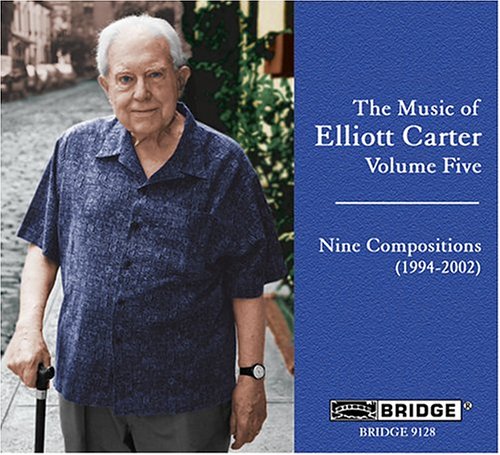
The Music of Elliott Carter, Volume Four Composer: E. Carter Conductor: Elliott Carter Performer: Susan Narucki, David Starobin, et al. Ensemble: Daniel Druckman Bridge - #9111 Volume four of Bridge's comprehensive Elliott Carter series includes the masterpiece, Eight Pieces for Four Timpani, as well as a number of short recent works. Particularly fine is David Starobin's performance of "Shard," a piece for solo guitar that is short but breathtakingly original. |
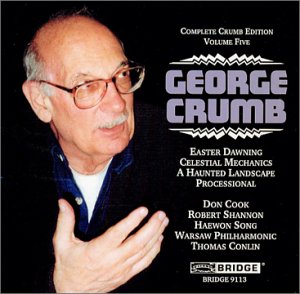
Complete Crumb Edition, Volume 5: Easter Dawning, Celestial Mechanics, A Haunted Landscape, Processional Composer: George Crumb Conductor: George Crumb Performer: Thomas Conlin Ensemble: Haewon Song , Robert Shannon Don Cook Bridge - #9113 The fifth release in Bridge's award winning Complete Crumb Edition includes the premiere recording of Crumb's1992 carillon solo, "Easter Dawning" played by Don Cook, carilloneur at Brigham Young University."Celestial Mechanics", for piano, four-hands is pure Crumb. "A Haunted Landscape" 1984) for orchestra is played by The Warsaw Philharmonic under conductor Thomas Conlin, the same combination that produced the Grammy-winning "Star-Child". |
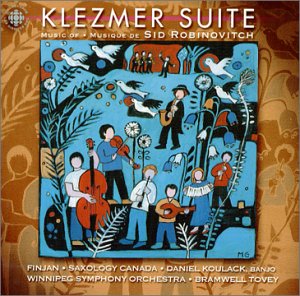
Klezmer Suite Composer: Sid Robinovitch Cbc Records --Naxos-- - #5212 |
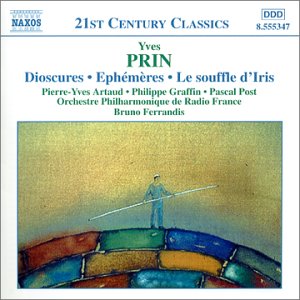
Dioscures, Ephemeres Composer: Yves Prin Conductor: Bruno Ferrandis Performer: Pierre-Yves Artaud Ensemble: Orchestre Philharmonique de Radio France Naxos - #8555347 Once you know that Prin was in Boulez's first composition class at IRCAM, the fact that all of these pieces are revisions of earlier pieces begin to make sense. Like the master, Prin is obviously a harsh critic of his own work. At 41 minutes, the disk covers a lot of contemporary territory and contains flashes of geninue originality. |
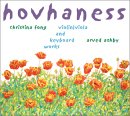
Violin|Viola and Keyboard Works Composer: Alan Hovhaness Performers: Christina Fong, Arved Ashby This disc might easily be subtitled "music to chill out by." Deceptively simple and meditative with just the right touches of exotic eastern mysticism, this is music that captivates through simplicity. A keeper. |
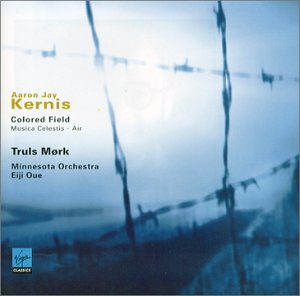
Colored Field · Musica Celestis · Air Composer: Aaron Jay Kernis Conductor: Eiji Oue Performer: Truls Mørk Emd/Virgin Classics - #45464 Some of Kernis' greatest hits retooled for Truls, who performs them magnificently.
|
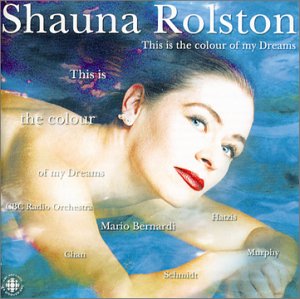
This Is the Colour of My Dreams Conductor: Mario Bernardi Performer: Shauna Rolston Ensemble: CBC Radio Orchestra Cbc Records --Naxos-- - #5214 Ralson is an enthusiastic advocate and performer of contemporary music. She has given the North American premiere of Gavin Bryarís concerto, "Farewell to Philosophy", Rolf Wallinís "Ground" for solo cello and strings, Krzysztof Pendereckiís Sextet for violin, viola, cello, piano, clarinet and horn, as well as the Canadian premiere of "Kai", a work for solo cello and 18 instruments by Mark Anthony Turnage. Here she delivers the world premieres of works written especially for her by Canadian composers Heather Schmidt, Christos Hatzis, Chan Ka Nin, and Kelly-Marie Murphy. |

Selected Songs Composer: Ned Rorem Performer: Ned Rorem, Carole Farley Naxos - #8559084 Pushing 80, Rorem continues to add to his extensive catalogue of over four hundred songs. His individual settings and cycles draw their texts from a wide range of poetry. Among his favorites sources have been Walt Whitman, Theodore Roethke, Kenneth Koch, Paul Goodman, and the English Metaphysical Poets. Nobody does art songs better. |
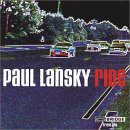
Ride Composer: Paul Lansky Bridge The title track, 'Ride', is a 19 minute piece made from sounds of a highway, processed and filtered to create sweeping sonic landscapes. An 8 channel version of the piece was played at Lincoln Center's 'Great Day in New York' festival in January 2000. |
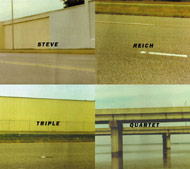
Triple Quartet/Music for a Large Ensemble/Electric Guitar Phase Steve Reich, Kronos Quartet, conductor Alan Pierson Wea/Atlantic/Nonesuch - #79546 This is the first recording of Reichís Triple Quartet performed by Kronos Quartet, who commissioned the work and in whose honor it was written. This disc, the first to include a new work by Reich since the 1996 release City Life, also features first recordings of Electric Guitar Phase and Tokyo/Vermont Counterpoint, as well as the first recording of a newly revised edition of Music for Large Ensemble. |
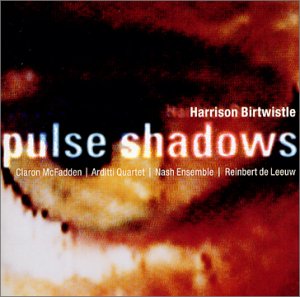
Pulse Shadows Composer: Harrison Birtwistle Wea/Atlantic/Teldec - #26867 Written for soprano, string quartet & ensemble of 2 clarinets, viola, cello and double bass, Pulse Shadows' nine string quartet movements alternate with the 'song' ensemble. The nine quartet movements comprise five Fantazias and four 'Friezes', of which the fourth is an instrumental meditation on Celan's famous poem Todesfuge (Death Fugue), with its strange recurrent image of black milk. |

Brahms · Stravinsky - Violin Concertos Composer: Johannes Brahms, Igor Stravinsky Performer: Neville Marriner Sony Classics - #89649 Thank heaven for little girls. Kid breathes new life into old workhorses. |
|
One-Minute Web Guide The essential guide to intelligent life on the internet |
Publisher: Duane Harper Grant (212) 582-4153 Editor: Jerry Bowles (212) 582-3791 Contributing Editors: Armando Bayolo, Sam Bergman, Joshua Cohen, Karina Cristina Demitrio, Deborah Kravetz (C) Sequenza/21 LLC 2000 |